France election: All you need to know ahead of the final vote
How the situation stands between Emmanuel Macron and Marine Le Pen ahead of final vote
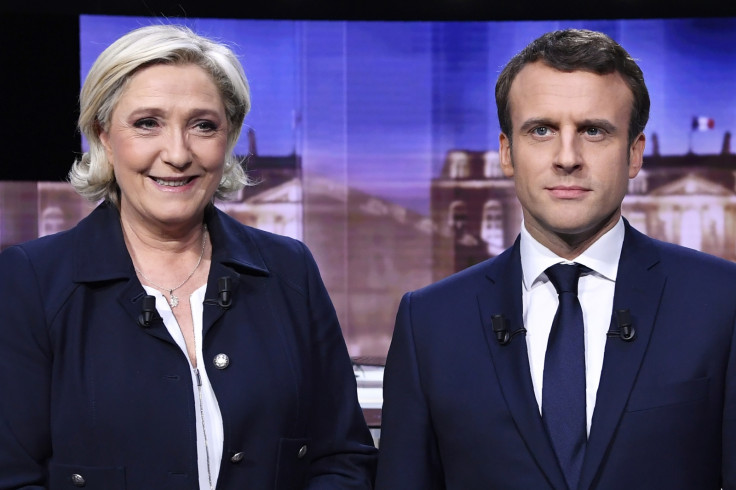
Emmanuel Macron and Marine Le Pen have taken the top two spots in the first round of the French presidential election. This marks the first time since 1957 that the two main candidates' for the presidency are from traditionally non-mainstream political parties.
Immerse yourself in the International Business Times UK special project, France 360, and discover the reality of Lille, Bourges and Béziers during the presidential campaign.
Election day is coming on 7 May and the pollsters still put Macron ahead in the race against Le Pen.
Who is leading the second round?
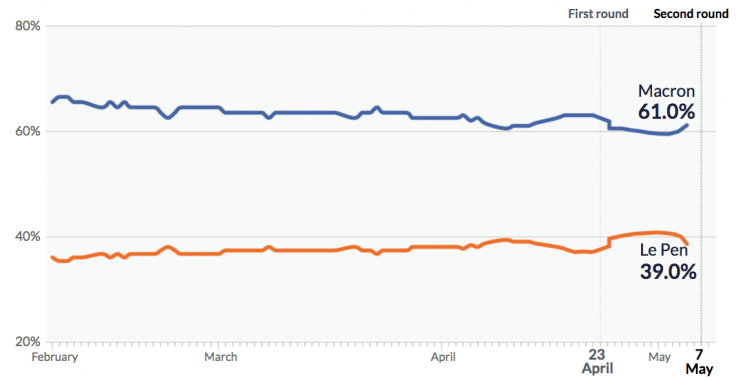
Macron vs Le Pen: their programmes
Both Macron and Le Pen have two opposing political agendas. From the pro-EU Macron to the populism and protectionism of Le Pen, the two presidential candidates have major differences.
International Business Times UK has analysed the candidates programmes and recent speeches. These are the key points:
ECONOMY
Macron
Unlike his rival, Emmanuel Macron is fully committed to the European Union, and is being dubbed by the French media as the most pro-EU politician in recent memory.
Macron wants to boost GDP with a five year-plan that will see €50bn invested in farming, transport, infrastructure, renewable energy and healthcare. He has also proposed €60bn in public spending and efficiency savings.
Finally, he also plans to cut France's headline corporation tax rate from 33% to 25%.
Marine Le Pen says her presidency will target 2% GDP growth by 2018, well above current economic forecasts by the Bank of France of 1.4%. Furthermore, she aims to grow GDP by 2.5% by the end of her five-year term.
She also wants tough negotiations with Brussels on "radical changes" to the European Union. Should they fail, she has said she would hold a referendum on France's membership of the bloc.
By 2022-23, Le Pen wants to cut France's burgeoning public deficit from 4.5% in 2017-2018 to around 1.3% of GDP. She is promising to cut taxes – including a 10% cut to income tax on the three lowest earning bands in France.
Le Pen has also said she would lower France's retirement age from 62 to 60.
SECURITY, TECH & IMMIGRATION
Macron's stance on security, both in the cyber-domain and in terms of national borders, is often viewed as softer, and more calculated, than Le Pen, who is running on a platform of anger and far-right rhetoric.
Last December, Macron was reportedly targeted – unsuccessfully – by the same hacking group that infiltrated the US Democratic National Committee (DNC) last year and leaked a trove of sensitive emails. Officials close to Macron said Moscow was likely involved.
The En Marche! hopeful was unmoved by the attempted hacking and did not shift his stance on national security policies as a result.
Unlike Le Pen, Macron has a set of policies that drift outside the realm of immigration control. On technology, he has been outspoken about his desire to work with social media giants Google and Facebook on topics such as encryption and curbing extremist content.
Le Pen is no stranger to tough talking on security. However, unlike her opponent, she consistently chooses to limit the topic – much like Donald Trump – to national security, immigration and border control.
Le Pen has promised to enact tougher immigration controls, often using the term "Islamist terrorism" to back up the argument. If elected, she had pledged to ditch the euro as a currency.
In a manifesto containing 144 separate proposals, she includes hiring 15,000 police officers, making room for tens of thousands of new prison inmates, expelling all foreigners who are on intelligence watch lists and leaving Nato's military command.
Le Pen does not often stray into the area of technology policy. However, she would appear to favour strong France-first legislation. This would likely bolster the nation's surveillance regime, force firms to store data domestically and attempt to clamp down on encryption.
EUROPE
Firmly pro-European, Macron will look to increasing common defence funding.
While remaining a strong supporter of Nato, he also wants the eurozone governments to create stronger partnerships.
He has campaigned in the last few months for a better integration of the union member states on fiscal, environmental and social policies, being always warmly welcomed in Brussels.
Le Pen wants to re-establish the French franc as currency, exiting the eurozone, and put the central bank under the control of the French Treasury.
She would also seek an EU referendum and she will try to renegotiate and redefine relationships with the EU.
She has also stated her plan to pull out of the EU farm subsidy programme and replace it with a new strategy limiting payments to Brussels.
WORLD
Macron is more open on free trade and has openly supported, during his presidential campaign, international deals as Ceta, the EU-Canada deal.
However, like most other candidates, he doesn't like the Trans-Atlantic Free Trade Agreement (Tafta), which France has already refused to back.
He's also convinced that a more democratic process of negotiation is needed in free trade accords.
Le Pen would reject international trade deals, preferring protectionism to favour French businesses.
She supports anti-globalisation and she would include a 3% tax on imports.
GOVERNANCE
Macron will require a clean criminal record as a prerequisite for all ministers, and will also ban the holding of more than one elected office.
He has plans to halve the size of early primary school classes, and to give all young people a €500 bonus that they can use for cultural activities.
Macron will try to transform the labour market, changing from the 35-hour week that many dislike to a more flexible system of overtime.
He is a strong defender of gay and lesbian rights.
Le Pen will try to bring back the seven-year presidential term and make it non-renewable.
She will also include a more strict secular rule with a ban on all forms of religious clothing in public services and spaces.
She also suggests the introduction of school uniforms and to remove any EU flag in public buildings, substituting them with only French flags.
Le Pen plans to maintain the 35-hour week and make overtime working hours tax free.
ENVIRONMENT
Macron wants France to adopt measures to fight climate change and make its economy "greener" – although many environmentalists argue he is not going far enough.
Macron wants to fund the development of renewable energies with the goal of doubling the amount of energy produced by wind turbines and solar technologies by 2022.
Although he wants to reduce France's reliance on nuclear energy, he wants this to happen gradually. To respond to the threat that diesel poses to air pollution, he wants all taxes on diesel to be raised to the level of those on petrol.
Macron wants to financially help farmers to transform their production models, to take into account animal suffering.
Le Pen wants to boost the role of renewable energies in France but she favours protectionist policies, "intelligent economic patriotism" and a mix of public and private investments to do so.
When it comes to nuclear energy, Le Pen wants to develop and modernise France's nuclear plants.
She is against higher taxes on diesel as she say they would penalise modest families who have been "pushed to acquire diesel cars" in the past.
Le Pen wants animal welfare to become a "national priority". This would include changing the way animals are slaughtered and using animals as little as possible in scientific experiments.
Who won the first round of the French Presidential Election?
These are the results from the first round:
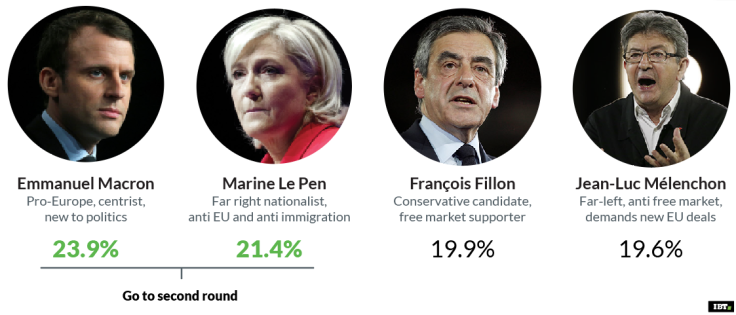
The geography of the first round
Both Macron and Le Pen will face each other on 7 May starting from radically different positions, and with a clearly defined electoral base.
This map shows the candidate who won the highest number of votes for each department in France.
Le Pen has taken vast areas of the country, especially on the eastern border of France. The National Front beat expectations in the French Riviera, winning almost all the departments. In the north, Lille, traditionally a socialist city, has moved to the more far-left Mélenchon, humiliating the socialist Benoît Hamon with less than 8% of the vote.
Macron, meanwhile, has taken most of west France, in regions predominantly right-wing but disillusioned by mainstream parties.
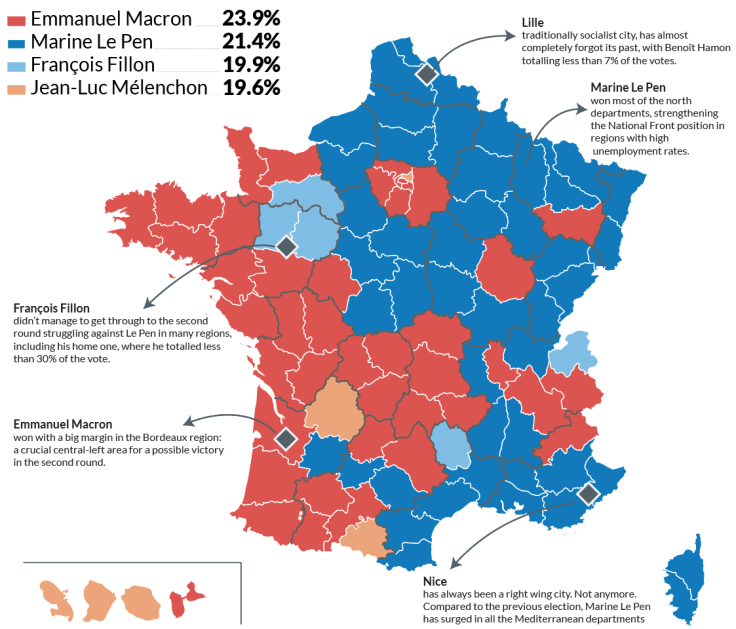
Macron vs Le Pen: where they won
These more detailed maps show the composition of the Macron and Le Pen voters.
The National Front candidate won the areas she campaigned most decisively in during recent months. These regions are also the ones that have the highest immigration fears and rising unemployment: two key battlegrounds for Le Pen.
Macron's En Marche! has, instead, won in economically dynamic regions and in large cities concentrated in the centre-west of the country, like Paris and Bordeaux. In these areas, Macron's pro-EU and pro-business positions have helped him win the trust of the more progressive French population, including the young and those with a higher education.
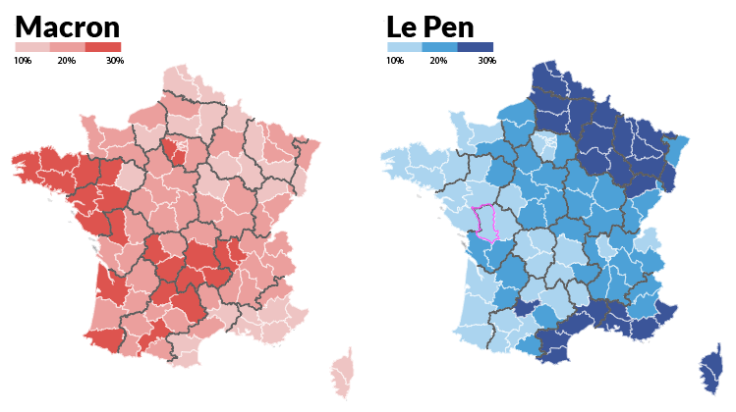
© Copyright IBTimes 2025. All rights reserved.






















